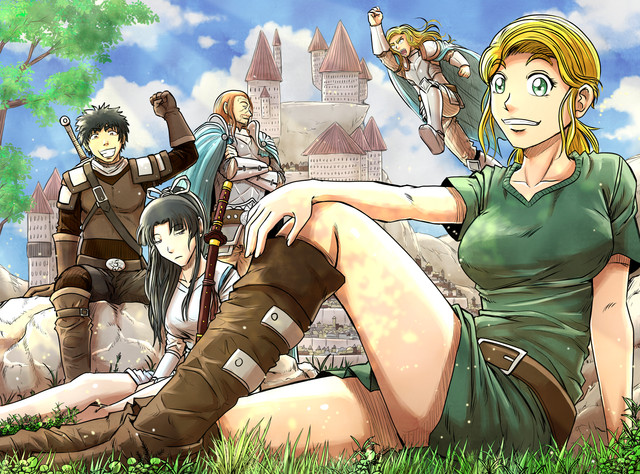HOME | DD
 QuantumBranching — Columbia and Britannia
QuantumBranching — Columbia and Britannia

#alternate #british #empire #history #map
Published: 2014-11-08 20:14:34 +0000 UTC; Views: 38888; Favourites: 130; Downloads: 265
Redirect to original
Description
OK, this is my take on the world of “Columbia and Britannia”, by Chamberlain and Dixon, an AH book in which we are asked to believe that a 1766 political compromise giving the American colonies political representatives leads to British north America still being pushed around by London in the year 2000. To avoid annoying myself too much, I have fiddled with things a little. OTL, as always, means Our Time-Line, the world we usually stumble around in.
It is the year 2000, and discontent is on the rise in British North America. Although in terms of population and economic output North America utterly dominates the British-speaking parts of the Empire, the Imperial Parliament still sits in London, and the same Anglicized, umbrella-swinging, *bowler hat-wearing[1], Oxford-Harvard-Cambridge-Yale elite still runs the show: most of the great corporations still incorporate in London (for tax purposes) and The City still dominates the world’s financial organizations. Moreover, culturally, Britain still is looked upon as the Standard of Excellence, and everyone who is in politics or entertainment tries to sound like the BBC announcers. The Confederation of Columbia, as the locals increasingly prefer to call it, is also hampered by a weak central government with the States holding a predominance of power, leading to regionalism and making all-America mobilization an exercise in cat-herding. This has admittedly hurt the British Empire in its various wars, North America rarely contributing in proportion to its actual economic and industrial strength, but, some Americans darkly suspect, they prefer this to having Columbia dominate in international affairs. And of course the King resides in England, although extended visits and stays in America have become common over the course of the 20th century. Many feel puzzled by the situation, which seems oddly contrived, as if by an alternate history writer with the bit between their teeth.
As the remaining “non-white” Empire shrinks, the increasing weight of North America is leading to some serious reexamination of what North America’s role should be: an increasingly sharp divide grows between those that think North America should cut ties to Britain and go its own way (an opinion most popular in the south east of the Mississippi [2]), and those who feel that North America should use its preponderance in the House of Commons to reshape the Empire in its own image, starting by moving the Imperial Parliament to New York or Boston. Much of the chummy, incestuous “bicoastal” (both sides of the Atlantic) elite oppose change on principle, but are increasingly trying to find ways to compromise with those in the “American Empire” faction to keep them onside against the “Separatists.”
Then there is the question of what to do about the Empire overseas. Most of the African colonies have been dropped as uneconomical, indirect control through client regimes or corporate dominance replacing direct rule (with no Communist International, new African countries have generally had fewer options in dealing with the power of global Capital). India has been the site of a grand experiment in “divide and rule”, with the “National System” organizing British India into more homogenous states (after length committee studies and endless border fiddling to satisfy all parties involved) then placed “on track” to independence – or increased British dependence, as the case may be. However, this strategy seems to be approaching the end of its shelf life, with the “Yes for India! No to national ghettoes!” movement calling for at least a unified India in what remains of the Raj, and most Princely states now dominated by parliaments rather than pliable absolute monarchs. The Dominion of India idea is being quietly dusted off, but will anyone go for it? There have been some successful cases of incorporation into the Imperial parliamentary system, notably Singapore and Guyana, but there are still just too many damn Indians…
The “War of Wars” is the closest this world has had to a World War II or I, and it failed to revolutionize the basic system, a long grinding European slog which failed to really change things much, although some tens of millions still died. Oddly enough, the Poles, Russians, and Germans were all on the same side for a while.
Politics tend to be a bit on the conservative side. The French got rid of their king rather later and with rather less blood than OTL, Marx never was born, and overall the effective “radical” opposition is on the Right, not the left [3]. (Something similar to OTL Anarcho-Syndicalism has had a few successes, but never has succeeded in taking over a major power, and *Anarcho-Syndicalist regimes have tended to be unstable).
Spanish America fell apart a bit later than OTL with no Napoleon, with British encouragement, and fell into roughly comparable chunks based on the same pre-existing administrative and regional divisions. As a whole, it remains rather dominated financially by the states of the British Empire, who work hard to keep out European and Japanese competitors. The stable and fairly prosperous Kingdom of Brazil is the most independent and powerful Latin American player.
Europe, with no Red Menace, did not receive a Marshall Plan post War of Wars, (although it was finally decided to not go in for reparations and almost all war debts were cancelled) and is relatively poorer than OTL, if still first-world. An EC-type organization is only just forming now, much to British distaste: the Brits already have the Russians and the Japanese to worry over (and the Chinese are visibly catching up in the rearview mirror) without a unified European block rejoining the big shots. The Balkans remain hotly contended between Russia and Germany-Poland spheres of influence; all three may temporarily have been allied during the last war, but the Russians have never ceased to grumble about their Galician “stolen lands” (never mind that they stole them from Poland before the Poles took them back: they were Russian in 1250 AD, that’s what matters!).
The Cape remained Dutch (until the locals decided they could afford independence) and the Kaapstadt is white/colored majority after some brisk ethnic cleansing of the most important diamond and gold mine areas. Britain established protectorates over some of the Natal coast African states, and established a foothold to the NW, but never went in for South African settlement in a large way (an outright conquest of the Cape with the Netherlands at peace was no longer considered Cricket by the later 19th century.) Africa, unlike Latin America, is sharply contended, with Japan currently Britain’s major challenger for influence among the “unaligned” countries, and the Ottomans influential in Islamic North Africa.
Russia has lost a few wars, but sheer size has kept it from being overrun by anyone, and it is finally catching up with the British in terms of living standards. Internal problems (provoked by fiendish British operatives, the Russian tabloids mutter) and quarrels with its neighbors have kept Russia largely focused on the Near Abroad (since Russia still rules most of the Ukraine, Kazakhstan, etc., it is a more extensive concept than OTL) and the Great Game has been over for a while: in any events, most Russians are too busy enjoying finally being prosperous to worry much about challenging the British and Japanese for influence in the less developed parts of the globe.
The Republic of China – corrupt, elitist, peasant-squeezing, but nonetheless a lot less oppressive than the PRC OTL [4] – is rapidly gaining in terms of economic size on the economic “big three” of Japanese Empire, British Empire-with-North-America, and Russian Empire, and will most likely be the largest economy in the world within a couple decades. Like Russia but even moreso, China sticks with regional interests and maintains a strict neutrality with respect to the squabbles of other Great Powers. Currently the Japanese are complaining about Chinese industrial pollution drifting into their Korean prefectures.
The Japanese are the closest the British Empire has to an Existential Foe, but since neither is presenting themselves as the representative of a universal principle destined to cover the whole world, things remain on the level of squabbles over national interest. (Although both are currently pointing a bunch of nukes at the other. Just in case). The Japanese compete fiercely with Imperials American and otherwise for markets and political influence: they have a lot of influence in Africa and the Middle East, compete with China for influence in SE Asia, and are slowly pushing their away into Latin America in spite of Anglo-American best efforts.
Currently, Japan is thumbing its nose at British claims to the Moon (see below). Japan is trying to get the Pan-Indian movement onto the Japanese bandwagon, but the dickish nature of the Japanese Empire has proven an obstacle: Japanese Nipponization of Korea and the Philippines over the last century has been thorough and brutal. Everyone speaks Japanese now, at least in public, and an increasing proportion of the Korean and Filipino population Nipponicizes their names to help get ahead. Not that there isn’t a resistance, far from it, but the secret police are everywhere, the only reason the state isn’t the electronic panopticon of our Department of Homeland Security’s wet dreams is that the technology isn’t quite there yet, and the strict censorship means most inhabitants of the Japanese Empire are only vaguely aware of its existence. The internet will be a problem when it arrives.
Japanese-Chinese relations have occasionally been fraught, but more effective Qing self-strengthening and an Empire-Republic transition that was less of a clusterfuck have meant that China always looked too strong for Japan to launch any major invasions, so there is less bad blood, although Taiwan and Outer Manchuria remain a source of contention. Japan has mainly sought to expand its influence _away_ from the Asian mainland.
Technology is a bit behind OTL, in other things beside computers. The first atom bomb (British) was developed in 1958, long after the end of the War of Wars, and the first man on the Moon, 1994, was British (most of the heavy lifting was done by the Americans, but the pilot was Welsh for the look of things). The Prime Minister of the time rather grandiosely claimed the Moon for the British Empire, which the Japanese ignored when they sent their first rocket [5] in 1998 and claimed the place in the name of Japan – currently none of the other major nations recognizes the claims, and there is currently a competition to build the first actual Moon base to solidify positions (and possibly take pot-shots at other Moon bases). The Space Race has mostly a Japanese-British thing, with the German, French, and Russian space programs being fairly low-key, but the Russians have recently put people in orbit and are talking about maybe building a space station.
[1] Currently more like a fedora. Hats remain important in this world.
[2] They’re the only ones setting off any bombs so far.
[3] Some of the major Polish and Russian political parties look rather like OTL Fascism, and Japanese politics is dominated by weenies of this stripe.
[4] Ironically given the PRC’s lefty roots, this ROC also spends proportionally more on social services.
[5] British and British North American commentators were rather sniffy about Japans oversized “firework” compared to the much more sophisticated spaceplane they had used, never mind the rocket’s lander carried three Japanese explorers to the spaceplane’s one Welshman.
Related content
Comments: 6

Brazilian Empire: 1822 to 1889
Brazilian Independence: 1822
👍: 0 ⏩: 0

Please, please include Amdo and Kham every time you draw an independent Tibet! This boarder of only U-tsang being independent is extremely disgusting. Even as a Chinese I rather see the whole Tibetan plateau go independent than only U-tsang.
upload.wikimedia.org/wikipedia…
👍: 0 ⏩: 0

Mind if you give me an insight as to what's going on in Romania in this TL?
👍: 0 ⏩: 0

Thank goodness someone else noticed the idiocy of the Dutch Bahamas. They looked like they put work into Africa then screw up such an easy-to-look-up thing right next door in the West Indies.
I get the feeling from your comments compared to The Two Georges, which is inaccurate but fun, Columbia and Britannia is pretentious in its seriousness and that makes its worldbuilding much more aggravating as a result.
👍: 0 ⏩: 0



























